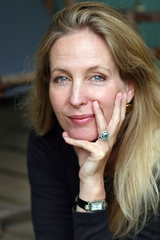A guest post from Bloomsbury author Katie Hickman.

When I first started writing I used to think that there was nothing in the world quite as intimidating as a blank sheet of paper. A thought I was reminded of only a few days ago when staring at one myself, waiting for the inspiration to begin my new novel, the next in the series after The Pindar Diamond.
There is something about it that always seems - well, so improbable somehow.
It always feels as though there’s something else I should be doing. Some sort of preparation: reading, researching, dancing round a maypole, perhaps? It’s the reason that writers’ houses are always supposed to be so terribly clean. We are forever putting off the evil moment.
It’s hard beginning any book, but novels are particularly difficult. Before you start it, a novel is something that does not yet exist. It is – what? A thought. A feeling. A castle in the air. In my own case, a ghostly presence (the character of John Carew) who has been stalking me for the last 15 years, damn him, wanting his moment in the sun.
Here are a few strategies that I’ve tried over the years. If beginning at the very beginning seems too daunting, I try writing small fragments (a description of a character or a place, or a piece of dialogue) which might end up at any point in the novel.
On Monday I started by writing a scene that I’ve had in my head for many months now. It’s rural England, 1606. Sometime towards a winter nightfall. A man in ragged clothes is making his way down an ancient drover’s path. Who is he? Where has he come from? Where’s he heading?
At first, it’s all horribly creaky, but I spend all Monday and Tuesday fleshing out a description of the man and the drover’s path (it helps that I have a real location in mind), and by Wednesday, suddenly, things are beginning to happen.
Everything I’ve been doing this week begins to feed into that one scene. I think of the photographic portraits I went to see at a friend’s exhibition on Bankside (Tessa Traeger: Voices of the Vivrais) and somehow they insinuate their way into my description of the man - who then mysteriously becomes two men.
My mystery man now has a companion, some sort of... well, he looks like a vagabond, or a country type that used to be called a ‘moocher’. Who is he? What’s he doing there? And where is he going?
(Want to know more? I will be writing a detailed, almost daily description of the process of writing this new novel in my blog.)
So: how do you begin a new novel?
Firstly, don’t wait for inspiration. Inspiration comes during the actual process of writing, not while you’re waiting to begin.
Instead: put a date in your diary. Sit down. Start writing.
For more on Katie Hickman see her Bloomsbury Publishing page and her official website.
Hmmm I never write a plot. I just start and the story (yeah I know corny but true) starts writing itself. Oh of course I have a faint idea, but most of the time characters that started of good turn into bad ones, the ones that were supposed to stay alive die, etc. And where I thought the story was going takes a ninety degree turn. So my advice, just start writing and see where it leads, that is after all half the fun! I almost never write character breakdowns, I pick a name and then as I write the character solidifies. First the name then the hair colour, build, clothing etc. Until it grows into one of those pesky characters that just won't leave you alone, hahaha! I always find ending a novel harder, because I just don't want to stop writing!
Writing a novel is not an easy task! it needs a lot of your time, determination and you sometimes ask yourself 'Is my writings really worth?'
I sit down and write ... I'm not a plotter - should I be?
Although someone once suggested interviewing my main characters, so I devised a list of questions and did this for my two main characters in my present WIP - kind of help me get to know the basics about them.
Other than that ..... for now I'm just writing!
Some great comments up there by the way - very interesting!